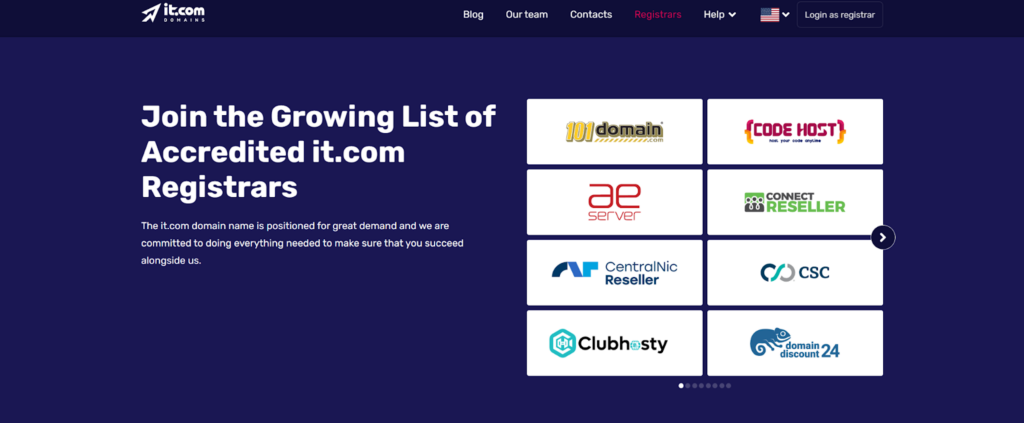- Joined
- Oct 12, 2023
- Posts
- 121
- Reaction score
- 47
Once you invest in registering a trademark, it’s essential to cover it online from financial and reputational harm. Domain names can play a crucial role in this process by securing your online presence. Learn some ways to extend your trademarks online with domain name registrations in this guide from it.com Domains.
It’s a common misconception that registering a trademark gives inherent rights to the same domain names across different domain zones. The concepts of domain and trademark registrations are distinct. You may have a trademark, but not have a domain with a similar name, and vice versa – you might have a domain, but not a trademark. So, how does this work in practical terms?
When you register a trademark, you secure the right to use a unique sign, logo, and/or name that effectively identifies your business within your particular class of business. This process, overseen by relevant authorities, such as the Patent and Trademark Office in the United States, grants you the right to commercially use this trademark within the business class that you registered it for. Yet, this right doesn’t automatically come with domain name registrations to match. At the same time, registering a domain doesn’t give you trademark rights.
For instance, if you own the trademark ‘Example’, you don’t automatically have the right to use the domain ‘example’ in any domain zone.
If the domain is available, you can buy it and register it on a zone-by-zone basis. If not, you might still be able to buy it from the current owner using reseller sites or brokers such as Sedo or Afternic. However, the process might be more complicated and require more time and money. If you can’t secure it, you can operate a business under the ‘Example’ trademark, but your domain will need to be different – e.g., ‘exampleonline’.
If you have already paid to register a trademark, investing in its online securing may be the next logical step to maximize your brand-building efforts.
Extending your trademark online is crucial for maintaining your company’s reputation and credibility. Unscrupulous individuals can use a domain name that resembles your trademark to mislead your potential customers. This can happen in two ways:
Both cases might be classified as trademark infringements if they contain protected characters or are too similar. A domain name closely resembling the name or logo of a well-known brand can confuse consumers and harm the company’s reputation.
For instance, if someone registers a domain name like ‘amazon-goods.com’ without permission from the Amazon brand, this can lead to legal problems. People may think the site is affiliated with or endorsed by the company, even though it isn’t.
However, this issue is gray and not always clear. A good example would be the situation with Coachella and Teachella. The organizers of the American music festival Coachella claimed that the owner of the Teachella Foundation, which organizes events for educators, was using their trademark in the teachella.net and teachella.org domain names without permission.
The organizers of Coachella filed a lawsuit, claiming that the domain names were similar to their own. In this case, it isn’t clear-cut, and it’s difficult to say for sure whether Teachella intentionally violated Coachella’s intellectual property rights or whether their domains simply sounded similar.
Having to deal with others whose domains resemble your trademark will require time and effort to contact the relevant authorities and prove your trademark rights have been violated.
There are also cases where companies register trademarks only to find the corresponding domain names have already been taken. If this happens, you won’t be able to accuse the domain owner of using your trademark through the domain because they registered the domain name before your trademark existed.
To avoid such problems, it’s extremely important to protect your brand online with protective domain registration. It involves registering a domain name (or names) identical or similar to your trademark to prevent other people from using it. Covering trademarks online with domain names is a key aspect that helps preserve your reputation and integrity.
Brand managers know that it’s essential to register domain names globally. If they don’t, others might register the same names to exploit their brand. This can lead to fraudulent activities like selling counterfeit products or services under the guise of a legitimate business.
To secure your brand with domains, you can:
1. Get your most important domain name(s) before getting your trademark. This is especially important in the .com zone and others that are global and most commonly used. It is the best way to prevent competitors from registering a domain name that matches a trademark you desire.
2. Register multiple domain names in different extensions. To extend your trademark online, consider registering multiple domain names that match or are similar to your brand. These should include variations with different extensions.
Explore the full range of domain extensions available. Consider the new gTLDs (generic top-level domains) and other emerging domain zones like .it.com, which are growing rapidly and are well-suited to your business. You can start your search with registrars and resellers such as GoDaddy, 101domain, CentralNic, and Porkbun.
You don’t need to register domains in every available zone. Start by selecting those that are significant and widely used. To make a well-informed decision, check the availability of the domain zone on various registrar and reseller websites. For instance, the .it.com extension currently has over 35 ICANN-accredited websites and domain resellers worldwide..

You can see the list of .it.com domain registrars and resellers in the Registrars section.
3. Register domains with relative or negative associations. You can register a domain with negative words that competitors could use to create harmful content about your business or product, such as example-badreview.it.com.
4. Stay updated with notifications from registrars and domain resellers. They usually inform customers about new, popular extensions that are available for registration. This allows you to secure your trademark before other companies register similar domains.
5. Keep an eye on domain name registrations. Make sure that no one registers domain names that infringe on your trademark. You can do this by regularly checking registrars’ or domain name resellers’ websites. Just enter the name you’re interested in into the search bar, and you’ll see what status it’s in.

On the it.com Domains website, if the domain name you are looking for is already registered, you will see the message ‘Domain Taken’. However, if the domain is available, you will see the registration cost and a shopping cart icon.
6. Use specialized tools. At the end of last year, GoDaddy launched the GlobalBlock service. This service allows trademark owners to prevent unauthorized use of their logos on top-level domains (TLDs). GlobalBlock also covers typos and homographs in internationalized domain names (IDNs).
7. Take action against trademark infringement. If you come across a domain name that violates your trademark, you can take action by sending a cease and desist letter or filing a complaint with the Internet Corporation for Assigned Names and Numbers (ICANN).
You can also contact the Patent and Trademark Office or a similar institution in your country.
8. Consider working with a domain registrar that specializes in protecting trademarks. Some registrars, including MarkMonitor and CSC Global, offer specialized domain registration services that include securing your trademarks.
As with all matters related to intellectual property, it’s recommended to consult with a trademark attorney. They can help you understand the situation and ensure you receive the best possible outcome.
Want to learn more about domain strategy in business? Visit it.com Domains blog and contact us on social media.
Continue reading at the it.com Domains blog...
What’s the Difference Between Registering Trademarks and Registering Domain Names?
It’s a common misconception that registering a trademark gives inherent rights to the same domain names across different domain zones. The concepts of domain and trademark registrations are distinct. You may have a trademark, but not have a domain with a similar name, and vice versa – you might have a domain, but not a trademark. So, how does this work in practical terms?
When you register a trademark, you secure the right to use a unique sign, logo, and/or name that effectively identifies your business within your particular class of business. This process, overseen by relevant authorities, such as the Patent and Trademark Office in the United States, grants you the right to commercially use this trademark within the business class that you registered it for. Yet, this right doesn’t automatically come with domain name registrations to match. At the same time, registering a domain doesn’t give you trademark rights.
For instance, if you own the trademark ‘Example’, you don’t automatically have the right to use the domain ‘example’ in any domain zone.
If the domain is available, you can buy it and register it on a zone-by-zone basis. If not, you might still be able to buy it from the current owner using reseller sites or brokers such as Sedo or Afternic. However, the process might be more complicated and require more time and money. If you can’t secure it, you can operate a business under the ‘Example’ trademark, but your domain will need to be different – e.g., ‘exampleonline’.
If you have already paid to register a trademark, investing in its online securing may be the next logical step to maximize your brand-building efforts.
Why Extend Your Trademark Online with Domain Registrations?
Extending your trademark online is crucial for maintaining your company’s reputation and credibility. Unscrupulous individuals can use a domain name that resembles your trademark to mislead your potential customers. This can happen in two ways:
- They may register a domain name that matches your trademark in extensions you haven’t yet taken.
- They may register a domain name that differs from your trademark by a few letters.
Both cases might be classified as trademark infringements if they contain protected characters or are too similar. A domain name closely resembling the name or logo of a well-known brand can confuse consumers and harm the company’s reputation.
For instance, if someone registers a domain name like ‘amazon-goods.com’ without permission from the Amazon brand, this can lead to legal problems. People may think the site is affiliated with or endorsed by the company, even though it isn’t.
However, this issue is gray and not always clear. A good example would be the situation with Coachella and Teachella. The organizers of the American music festival Coachella claimed that the owner of the Teachella Foundation, which organizes events for educators, was using their trademark in the teachella.net and teachella.org domain names without permission.
The organizers of Coachella filed a lawsuit, claiming that the domain names were similar to their own. In this case, it isn’t clear-cut, and it’s difficult to say for sure whether Teachella intentionally violated Coachella’s intellectual property rights or whether their domains simply sounded similar.
Having to deal with others whose domains resemble your trademark will require time and effort to contact the relevant authorities and prove your trademark rights have been violated.
There are also cases where companies register trademarks only to find the corresponding domain names have already been taken. If this happens, you won’t be able to accuse the domain owner of using your trademark through the domain because they registered the domain name before your trademark existed.
To avoid such problems, it’s extremely important to protect your brand online with protective domain registration. It involves registering a domain name (or names) identical or similar to your trademark to prevent other people from using it. Covering trademarks online with domain names is a key aspect that helps preserve your reputation and integrity.
How to Extend Your Trademark Online with Domains
Brand managers know that it’s essential to register domain names globally. If they don’t, others might register the same names to exploit their brand. This can lead to fraudulent activities like selling counterfeit products or services under the guise of a legitimate business.
To secure your brand with domains, you can:
1. Get your most important domain name(s) before getting your trademark. This is especially important in the .com zone and others that are global and most commonly used. It is the best way to prevent competitors from registering a domain name that matches a trademark you desire.
2. Register multiple domain names in different extensions. To extend your trademark online, consider registering multiple domain names that match or are similar to your brand. These should include variations with different extensions.
Explore the full range of domain extensions available. Consider the new gTLDs (generic top-level domains) and other emerging domain zones like .it.com, which are growing rapidly and are well-suited to your business. You can start your search with registrars and resellers such as GoDaddy, 101domain, CentralNic, and Porkbun.
You don’t need to register domains in every available zone. Start by selecting those that are significant and widely used. To make a well-informed decision, check the availability of the domain zone on various registrar and reseller websites. For instance, the .it.com extension currently has over 35 ICANN-accredited websites and domain resellers worldwide..

You can see the list of .it.com domain registrars and resellers in the Registrars section.
3. Register domains with relative or negative associations. You can register a domain with negative words that competitors could use to create harmful content about your business or product, such as example-badreview.it.com.
4. Stay updated with notifications from registrars and domain resellers. They usually inform customers about new, popular extensions that are available for registration. This allows you to secure your trademark before other companies register similar domains.
5. Keep an eye on domain name registrations. Make sure that no one registers domain names that infringe on your trademark. You can do this by regularly checking registrars’ or domain name resellers’ websites. Just enter the name you’re interested in into the search bar, and you’ll see what status it’s in.

On the it.com Domains website, if the domain name you are looking for is already registered, you will see the message ‘Domain Taken’. However, if the domain is available, you will see the registration cost and a shopping cart icon.
6. Use specialized tools. At the end of last year, GoDaddy launched the GlobalBlock service. This service allows trademark owners to prevent unauthorized use of their logos on top-level domains (TLDs). GlobalBlock also covers typos and homographs in internationalized domain names (IDNs).
7. Take action against trademark infringement. If you come across a domain name that violates your trademark, you can take action by sending a cease and desist letter or filing a complaint with the Internet Corporation for Assigned Names and Numbers (ICANN).
You can also contact the Patent and Trademark Office or a similar institution in your country.
8. Consider working with a domain registrar that specializes in protecting trademarks. Some registrars, including MarkMonitor and CSC Global, offer specialized domain registration services that include securing your trademarks.
As with all matters related to intellectual property, it’s recommended to consult with a trademark attorney. They can help you understand the situation and ensure you receive the best possible outcome.
Want to learn more about domain strategy in business? Visit it.com Domains blog and contact us on social media.
Continue reading at the it.com Domains blog...


















